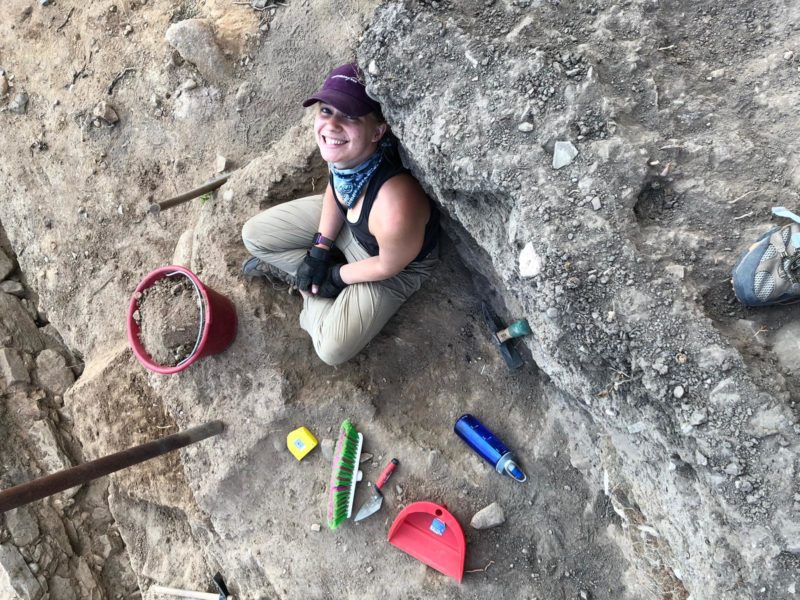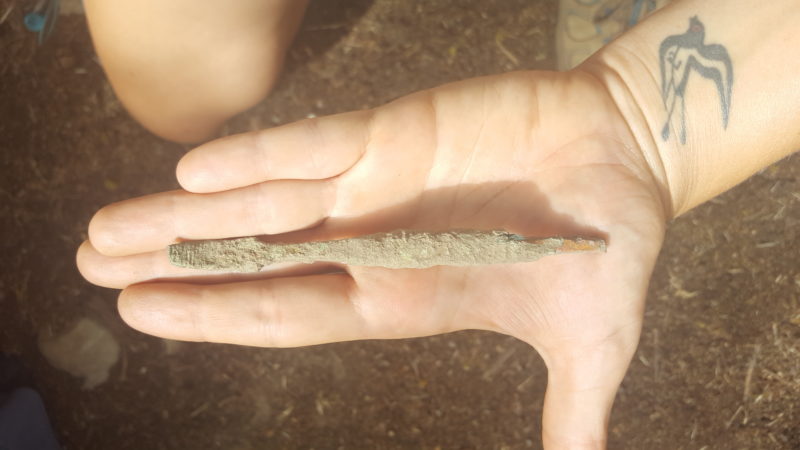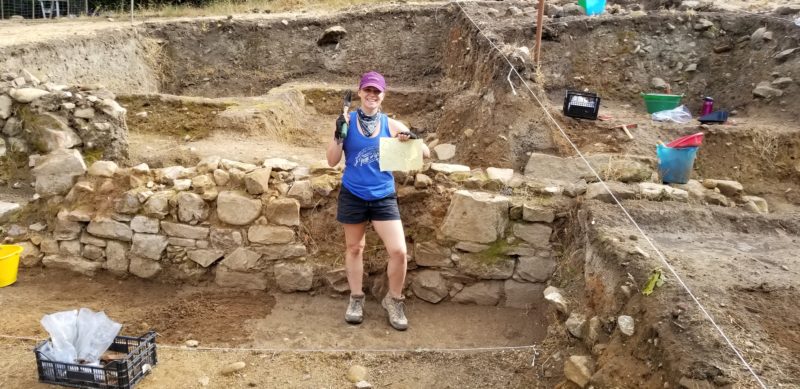
As a kid growing up in Washington State, Dr. Christie Vogler was a big fan of “Wishbone,” a children’s TV series that features a Jack Russell terrier named Wishbone who “brings classic literature to life and imagines himself as the live action hero in each tale.”
Vogler, now an assistant professor of history at the University of Lynchburg, was particularly enrapt by an episode where Wishbone — as Odysseus from Homer’s “The Odyssey” — shoots an arrow through 12 ax heads.
Vogler “inhaled” C.S. Lewis’s “Narnia” books, young adult fantasy, and the historical fiction series “Dear America,” in which girl protagonists tell stories from America’s past — Salem witch trials, the Great Depression, etc. — through diary entries.
The budding archaeologist and her younger brother spent hours digging in their backyard, former site of a blacksmith’s shop, for what they called “lava rocks,” but later learned was slag. It was when Vogler’s family got their first computer, though, that her love affair with the ancients was sealed.
“I found a website that just had all this information on the Greek gods and heroes,” she said. “I would click on three links each day, print out all the information, and organize it in a folder I had in alphabetic order.”
Vogler went on to college — Yakima Valley Community College, then Whitman College — and majored in anthropology. After studying abroad in Athens, Greece, her junior year, her focus broadened.
In Athens, she saw archaeology firsthand and realized how mythology was “informing the lives of the ancient people.” She wanted to combine her interests in mythology, history, and anthropology and learn more about the people who built the temples and made the pottery.
“At that point, I was hooked,” she said.
After earning her bachelor’s degree at Whitman, Vogler got a master’s and a PhD in anthropology at the University of Iowa. In 2012, while a grad student at Iowa, she made her first trip to Sicily to work on the Gangivecchio Archaeological Project.
At Gangivecchio, a Roman villa that dates to the first to fourth centuries CE, or “common era,” Vogler helped excavate a 10-by-10-foot plot — Plot 19, to be exact.

She returned to the site in 2015, 2017, 2019, and 2022, and also used her research as a basis for her PhD thesis, “The Women of Gangivecchio: Investigating Gender, Wealth, and Work in the Agricultural Economy of Roman Sicily.”
Among other things, her thesis “argues for the presence of a female medical practitioner … working out of the Roman villa at Gangivecchio within the dates of its occupation and likely destruction sometime in the fourth century CE.”
Over the years, she and other Gangivecchio researchers found a host of items, among them coins, ceramics, hair pins, roof tiles, human remains, and medical instruments, including a “bone lever” used to reset a broken bone.
Vogler and research partner and friend Elijah Fleming, a PhD candidate at the University of Texas at Austin, started wondering whether these medical tools could have been used by female doctors or healers, called “medica.”
“One individual we found in 2015, she was of advanced age,” Vogler said, referring to human remains found at Gangivecchio. “We nicknamed her ‘Rosa.’ We looked at her … and she has all sorts of osteophytes that can be seen a little in her finger bones and different parts of her vertebrae. Some bone growth from one lumbar to another.”
There also was some indication that “Rosa” had been holding something between her teeth for a long period of time. While this could have been a pipe or other object, it also could have been a means to relieve pain. Based on the evidence, Vogler said, it appeared that “Rosa” had been in a lot of pain and needed care, possibly from a female doctor.

Vogler also has seen more direct evidence that medica played an important role in ancient Roman life. One of her favorite examples is a gravestone inscription for a female doctor that indicates her husband had lost both his health care and his source of income with her death.
“This was a way for women of lower status to gain independence,” Vogler said, adding that evidence of this is shown most often not in “texts by Hippocrates but by dedications. They were important members of society.”
Next year, Vogler will do a presentation about ancient female medical practitioners at the 2023 Archaeological Institute of America conference in New Orleans. She has talked about her research on the podcast “Let’s Talk About Myths, Baby!” in the episode, “Conversations: The Intersection of Magic & Medicine, Women as Medica in the Ancient World.”
Vogler co-hosts another podcast, “Movies We Dig,” billed as the “podcast about film, antiquity, and everything in between.” At least one University of Lynchburg student, Sam Lipert ’23, has appeared on the podcast as well.
At Lynchburg, Vogler is the faculty advisor of the Student Archaeological Society. She teaches Turning Points in World History, Introduction to Archaeology, Archaeology Lab, Greek Civilization, and Roman Civilization.
She recently developed a new course, Gender Archaeology in the Ancient World. “It will be a chance to look all over the ancient Mediterranean world at how ideas of sex and gender were being defined or imagined or presented in material culture: artwork, pottery, texts. … I’m excited about this course.”
Soon, Vogler hopes to share not only what she’s learned at Gangivecchio, but the archaeological site itself, with her students. She wants to take students to Sicily next summer, where they’ll help catalog items found on previous digs.
“It’s a huge goal of mine,” she said, adding that she also plans to have students “pursue a research question about the collection as they analyze and catalog the artifacts.
“In particular, there are many ceramics and faunal remains that need to be studied. Any conclusions they draw will be included in the report to the [site superintendent]. If possible, we would do a public presentation to the community of Gangi as well.
“That helps address a big issue in archaeology. Excavations generate so much material that is not always revisited to be studied and published for the public. In this way, it also offers a unique opportunity to work with members of the local community.”
Vogler also likes to show her students that studying archaeology or history doesn’t mean you’re locked into a particular path. She recalled an artist who makes jewelry based on Roman coins and the ways mythology and the ancient world are represented in music videos.
“You don’t have to dig in the dirt,” she said. “You can make a TV show or artwork. There’s a lot going on in the ancient world.”

